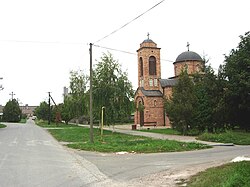Sečanj
|
Sečanj Сечањ |
|
|---|---|
| Town and municipality | |

The new Orthodox Church
|
|
 Location of Sečanj within Serbia |
|
| Coordinates: 45°22′00″N 20°46′21″E / 45.36667°N 20.77250°ECoordinates: 45°22′00″N 20°46′21″E / 45.36667°N 20.77250°E | |
| Country |
|
| Province | Vojvodina |
| District | Central Banat |
| Government | |
| • Mayor | Predrag Milošević (SNS) |
| Area | |
| • Total | 523 km2 (201.9 sq mi) |
| Population (2011) | |
| • Village | 2,373 |
| • Municipality | 13,267 |
| Time zone | CET (UTC+1) |
| • Summer (DST) | CEST (UTC+2) |
| Postal code | 23240 |
| Area code(s) | +381(0)23 |
| Car plates | ZR |
Sečanj (Serbian Cyrillic: Сечањ) is a village and municipality located in the Central Banat District of the autonomous province of Vojvodina, Serbia. The village has a population of 2,373, while the Sečanj municipality has 13,267 inhabitants.
"Sečanj" is a Slavic name for the first month in the calendar year. The Serbian Ekavian variant of this name was eventually replaced with the new word "Januar" (corresponding to the common months as known in Western European cultures), while the Croatian Ijekavian variant "Siječanj" remains in use in Croatia.
In Serbian, the village is known as Сечањ or Sečanj, in Hungarian as Szécsány or Torontálszécsány, in German as Setschan or Petersheim, in Croatian as Sečanj, and in Romanian as Seceani.
Serbian, Hungarian, and Romanian language are officially used by municipal authorities.
The settlements with Serb ethnic majority are: Sečanj, Banatska Dubica, Boka, Jarkovac, Jaša Tomić, Krajišnik, and Sutjeska. The settlement with Hungarian ethnic majority is Busenje. Ethnically mixed settlements with relative Serb majority are: Konak, Neuzina and Šurjan.
The Sečanj municipality includes the town of Jaša Tomić and the following villages:
Old houses
Filling-station in the village
TORONTÁL-SZÉCSAN in the Kingdom of Hungary (Torontál County) in 1871
...
Wikipedia
